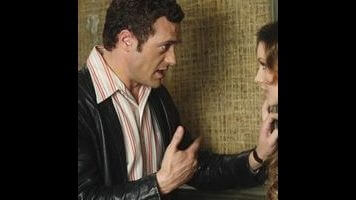Life On Mars: "My Maharishi Is Bigger Than Your Maharishi"

So far, the aesthetic of Life On Mars has been one of the best things about the show, from the score to the lighting to the set designs. It's all nearly realistic without ever being entirely solid–every so often, the line blurs just enough, and you wonder if maybe this is a dream after all.
That makes it trickier to judge individual episodes, because a number of flaws can be explained away if it turns out the whole thing is just Sam's hallucination. "My Maharishi Is Bigger Than Your Maharishi" was decent. The procedural elements, while not revolutionary, were handled more convincingly than last week, and the usual outré twists were as engaging as always. The speechifying, though, was ridiculous. As Sam dealt with bigotry, Vietnam vets, and the eternal war between hippies and The Man, "Maharsihi" often played like particularly tortured afterschool special.
But–and here's where the trickiness comes in–how much of that is intentional? If Life On Mars wants to replicate the sound and look of a seventies cop drama, heavy-handed moralizing comes with the territory. As does a mystery that gets tied up in a neat package at the fifty minute mark. I'm willing to have a certain amount of faith here, but I need some assurance that what we're seeing is all part of the act, and not just the ham fisted mark of hackdom.
The body of a murdered Vietnam veteran is found in the park, and the 125 is on notice. Hunt has a thing about dead vets, and there's a lot of talk of him driving everyone into the ground if they don't find the killer fast. It's really just talk; Hunt gives a couple of lectures and beats on some suspects, but there's no real sense of him on the warpath. We've yet to see any consequences from his supposed fury–apart from some scuffling with Sam, he seems like you average, probably-should've-retired-years-ago boss.
Initially, everybody but Sam blames the hippies. We get a lot of dancing moon people in "Maharashi," and it's presented as such a blatant stereotype that it has to be purposeful. They're frolicking in the park, they're tripping and grooving on life, and they're listening to guru give them the good word on the nature of the universe. Ray blasts them as anti-American and is convinced they're involved in the death. Sam tries to defend their right to protest, and we get another in a long series of talking-heads style conversations. (As in "Characters spouting personality-less rhetoric," not "Once In A Lifetime.")
Sam catches a break when he and Annie interview one of the corpse's former acquaintances; Annie suspects he's gay, which leads Sam to decide that the corpse, Robert Reeves, was gay too. At least while he was alive. Either Sam's still working off the head-blow he got when the car hit him, or else he just doesn't care, because he decides it would be a good idea to break their deduction to Hunt and the others. It goes about as well as you'd expect.
A trip to a gay bar that Robert used to visit (his son had one of their matchbooks) tips Sam off on a series of attacks targeting local homosexuals in the park. Sam and Annie rope Chris in as bait for a sting operation that nets three asshole punks. The punks didn't kill Reeves, but one of them saw who did; John Fisher, a member of Robert's platoon overseas. They'd had a relationship during the war, and back home, Robert wanted to continue the relationship. John didn't, and things got nasty.
 Keep scrolling for more great stories.
Keep scrolling for more great stories.
